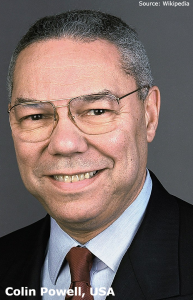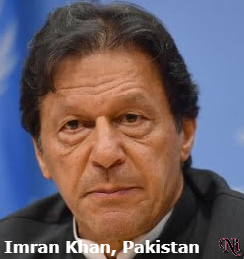Dr. Rizwan Naseer
Strategic Security Analyst, Pakistan
The puzzle that an educated Pakistani attempts to solve is that, ‘why has Pakistan been so special in America’s grand strategy in the cold war and post-cold war times?
An obvious reason has been Pakistan’s geostrategic location to keep a check on communist China and the Soviet Union.
No other countries could offer such a strategic advantage to American interests in the Afghan war (1979-89) and war against terrorism (2001-2021).
But on the other hand, Pakistan always complained that America remained an unfaithful friend.
To unfold U.S-Pakistan relationship, there is a need to understand the historical estranged U.S. engagement with Pakistan.
This piece does not cover the entire incident but some crucial junctures when Pakistan-U.S. interests converged and diverged.
It also underlines when the U.S. foreign policy backfired in the case of Pakistan.
Pakistan’s relations with the U.S. have been both cooperative and conflictive since the early years of its formation.
The reason for this very patron-client relationship has been the U.S. demands to establish military bases in Pakistan and exercise influence on Pakistan’s foreign policy.
During Pakistan’s first Prime Minister Liaqat Ali Khan’s visit to the U.S., Harry S. Truman demanded military bases to perform surveillance missions on the Soviet Union.
But the request was turned down due to sovereign rights and security considerations.
During President Ayub’s regime, U.S. flew spy mission over Soviet Union using Pakistan’s territory. Despite U.S.-Pakistan’s cooperative years of relationship Ayub Khan termed that U.S. treated Pakistan like a domineering power.
The central theme of the Ayub Khan’s memoir “Friends not Masters: A Political Autobiography” is that “People in developing countries seek assistance, but on the basis of mutual respect; they want to have friends not masters”.
Pakistan signed up to U.S. – sponsored security agreements SEATO and CENTO which helped through economic and military aid. That economic assistance helped to counter the influence of communism only, not to guard Pakistan against any external threat of aggression.
During Z.A Bhutto’s regime, Pakistan retained and upgraded CENTO membership despite challenges from regional actors (China and USSR).Pakistan’s joining of the Regional Cooperation and Development (RCD) in 1964 with Turkey, Iran and CENTO members did not support Pakistan during the 1971 war with India.
Pakistan’s expectations were not of receiving any military support but diplomatic support to thwart Indian aggression.
President Yahya Khan already had written a letter to the U.
S. President Nixon and did aware him about Indian involvement in equipping, training and supporting Mukti Bahini.
The tragedy of the dismemberment of East Pakistan is unforgettable for all Pakistanis and they mostly raise questions about what Pakistan got by joining U.
S.-sponsored security pacts while its own national security was threatened.
Determined to catch up with Indian nuclear status and avoid nuclear blackmailing , Z.A. Bhutto- the architect of Pakistan’s nuclear program daringly said “if India built the bomb, “we will eat grass, even go hungry, but we will get one of our own.” Bhutto’s resolve to acquire atomic bomb created some schism in Pakistan-U.S. relations.
The U.S. President Jimmy Carter emerged as a staunch opponent of nuclear proliferation whereas Pakistan posed a thorny challenge to his administration.
A senior State Department official Gerard Smith proposed a confrontational approach (Sunshine Policy) to mount pressure on Pakistan whereas Jimmy Carter’s administration rejected that policy on the grounds of further damaging relations and broader interests in South Asia.
The U.S. President Jimmy Carter found Pakistan in violation of the Symington amendment in 1979 because of Islamabad’s resolve to acquire the nuclear bomb.
An Islamabad-based journalist stated that the U.S. had achieved the strategic goal of containing Soviet expansion and it was no more in the mood to support Pakistan with finance and military equipment.
Zia’s Islamization drive, aimed at contributing recruitment to Afghan Jihad continued even after his death and embroiled Pakistan in sectarian strife.
A common Pakistani feels betrayed by the U.S. due to its hostile policies.
Pakistan was lured into the Afghan war (1979-89) in the name of Jihad just to contain red-army within Afghanistan, not to promote Islamization.
The U.S. Congress adopted the Pressler amendment and banned majority of the military and economic aid to Pakistan unless the state was able to provide concrete evidence that Pakistan was not spending the aid to develop nuclear weapons.
It is widely believed that Pakistan had lost its strategic significance in American foreign policy after the disintegration of Soviet Union.
Therefore, relations between 1991 to 1998 remained uncordial.
However, after the Indian nuclear tests (Pokhran-II) on 11-13 May, 1998 and Pakistan’s retaliatory nuclear tests (28 May, 1998) President Clinton invoked sanctions against India and Pakistan.
At another juncture when in the aftermath of 9/11 the U.S. had decided to launch war against terrorism in Afghanistan, US Secretary of State Colin Powell coerced Pakistan by asking “you are either with us or against us” Musharraf could negotiate smartly but he was a dictator and needed legitimacy for his rule, therefore, agreed quickly to U.S. demands .

The blunder that U.S. made was to seek the approval of Musharraf only whereas that was not enough.
People of Pakistan never supported the narrative of U.S. global war against terrorism.
That is why U.S. operations never got public support.
A war without active support of public is counterproductive. Public outrage in response to U.S. drone strikes in Pakistan increased due to collateral damage.
The U.S. had poor intelligence about the terrorist hideouts which resulted in collateral damage.
Anti-American sentiment in Pakistan turned into radical anti-Americanism an obvious example is when Raymond Davis, a CIA contractor was caught in the killing of two Pakistanis.
Public outrage mounted and they demanded death penalty for him but then Pakistan’s Prime Minister Yousaf Raza Gillani assisted his release fearing cracks in Pakistan-US relations.
The U.S. violated Pakistan’s sovereignty by launching “Operation Neptune Spear” to hunt down Osama Bin Laden in Abbottabad in May, 2011. Public sentiment was all-time high, how could U.S. dare to enter Pakistan’s territory whereas Pakistan was the partner in global war against terrorism and a non-NATO ally?
It was never treated as a non-NATO ally but a frenemy.
Salala Check post incident (26 November, 2011) brought Pakistan and the U.S. relations to the lowest ebb.
As the unprovoked and indiscriminate attack by the NATO forces in Mohmand tribal region killed 24 Pakistani soldiers and 13 were injured.
Pakistan stopped NATO supplies and that affected bilateral ties to the greater extent. America’s tortured relationship with Pakistan seriously lacks durability and credibility and the fragile nature of this relationship evokes a sharper reaction in Pakistan.
After realizing the U.S. failure in Afghanistan, the Trump administration had plans to pull out American troops but it got delayed.
Pakistan helped the U.S. in its negotiations with Taliban by providing good offices.
It hurts the feelings of majority of the Pakistanis when the U.S. instead of acknowledging sacrifices of Pakistan, demands to “do more”.
Pakistan-US relations under the popular regime of Imran Khan remained strained due to bold stance of mutual respect in bilateralism.
As Imran Khan became the first Prime Minister of Pakistan against whom the vote of no confidence succeeded.
He alleged that U.S. had backing in his ouster this letter-gate matter brings Pakistan-US relationship to another tipping point.

Khan enjoys popular support among masses and he holds some officials of the U.
S. government responsible for the vote of no confidence motion.
But the matter is how this bilateral relationship will move forward when anti-Americanism is on the rise again?
Pakistan has entered into an era when youth is politically activated and they demand relationship with the U.S. on an equality basis not subservience. Pakistan-US relationship is crucial for peace and stability of Afghanistan.
This bilateral relationship is highly crucial for both the countries regarding their respective national interest in the region as well as across the globe.
There is a need for renewed engagement with the objective of promoting common interest.
The U.S. also has concerns that Pakistan has tilted towards Russia after former PM Imran Khan’s visit to Moscow.

Such misconceptions can be addressed only through diplomatic engagement, not processions.
After the Russian-Ukraine war, the U.S. needs more diplomatic support from Asia, to defeat Moscow’s narrative on diplomatic front and devoid her off friends.
It becomes a natural choice for the U.S. to reengage with Pakistan.
Disclaimer: The views expressed here are authors and do not necessarily express the opinions of the Organization he works for.
# the author could be reached at multiirizzz@gmail.com
# Dr. Rizwan’s opinions expressed here in the article are his own: Chief Ed. telegraphnepal.com
#Thanks the distinguished author Dr. Rizwan Naseer, Pakistan: Ed. Upadhyaya.
Our contact email address: editor.telegraphnepal@gmail.com

